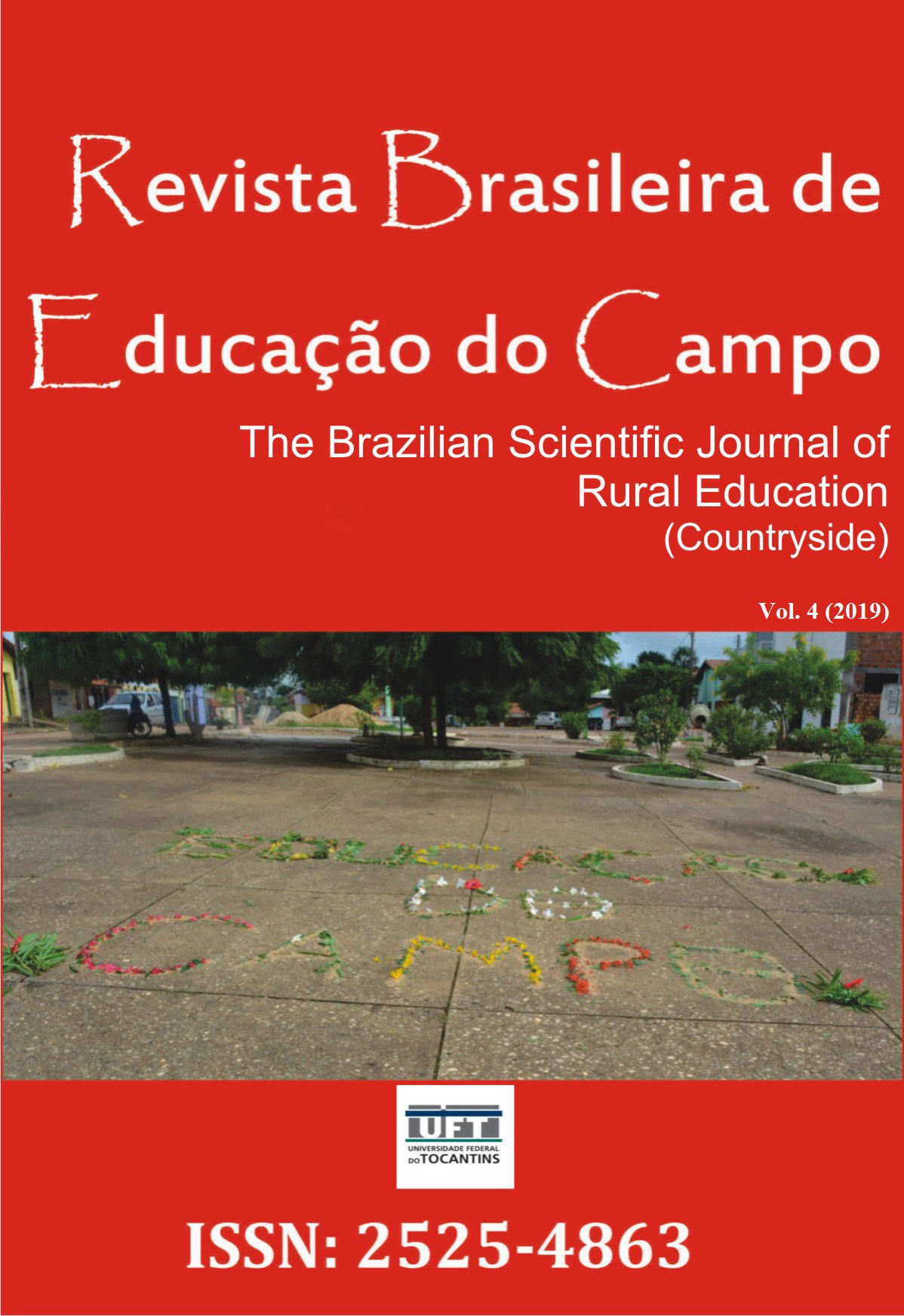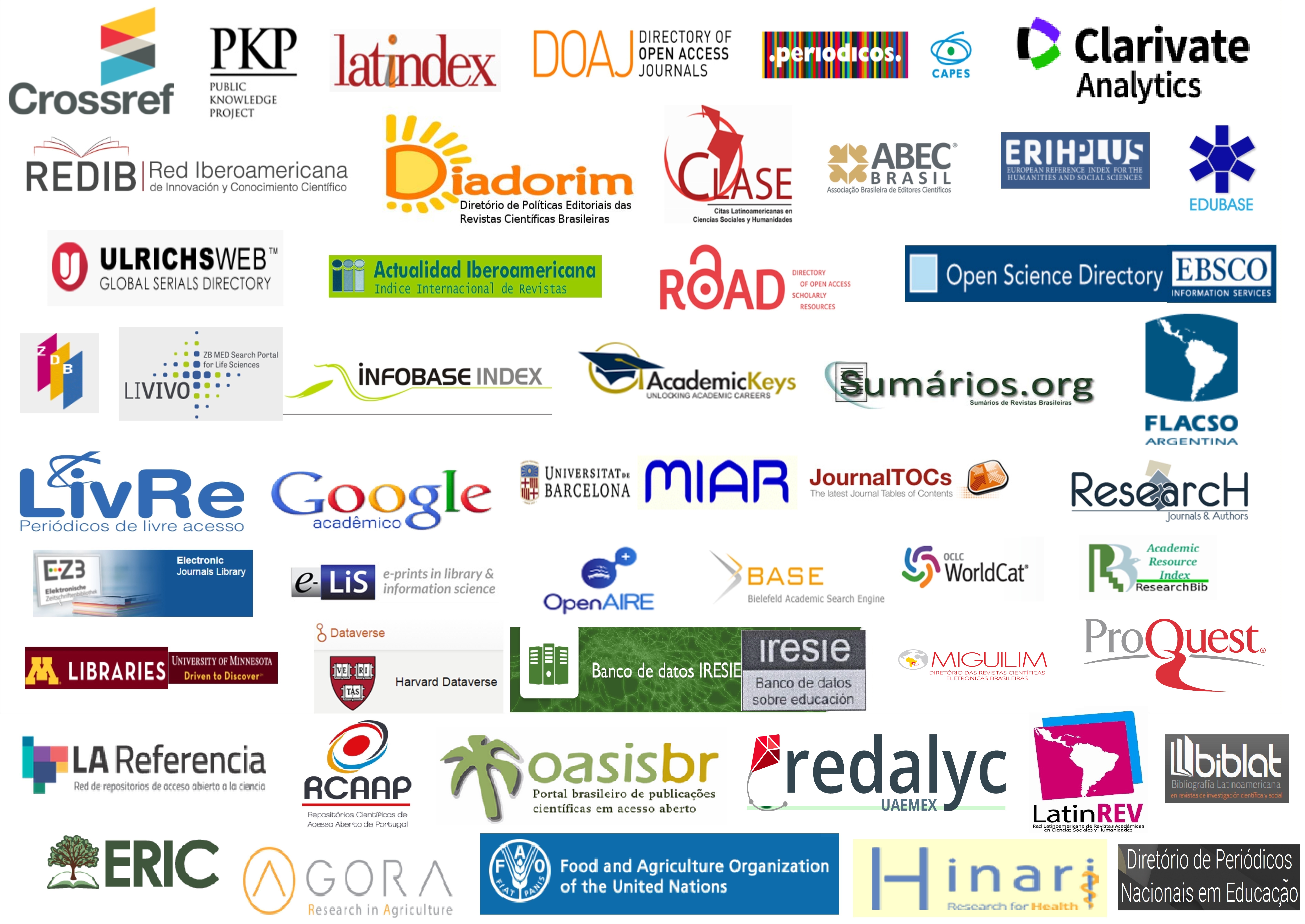Pedagogia da Alternância em comunidade pomerana de Santa Maria de Jetibá, Espírito Santo, Brasil
DOI:
https://doi.org/10.20873/uft.rbec.e7129Resumo
O artigo analisa aspectos da Pedagogia da Alternância, compreendida na perspectiva de Nosella (1977, 2012), e sua relação com a cultura pomerana. Toma como objeto de estudo a Escola Estadual Emílio Schroeder, situada em Alto Santa Maria, Santa Maria de Jetibá, Espírito Santo, Brasil, para entender como tal comunidade, com presença significativa do povo tradicional pomerano, compreende o projeto de alternância. Com abordagem qualitativo-descritiva, beneficia-se de narrativas de uma professora-monitora com significativa experiência em Escolas Família Agrícola e, adicionalmente, analisa um conjunto de documentos constituído por 52 fichas-questionários aplicadas em 2011 às famílias dos alunos. O tratamento interpretativo das respostas a quatro itens de tal instrumento permitiu constatar que, decorrida uma década da implantação do regime de alternância na escola, ocorrida em 2001, e não sendo os pais que responderam a tal instrumento os mesmos que lutaram pelo regime de alternância na escola, houve mudanças no significado atribuído pelas famílias e comunidade em geral a esse modelo educacional no contexto social analisado. Destaca-se que as dimensões culturais e identitárias do povo tradicional pomerano podem contribuir para a problematização do projeto escolar; que a iniciativa das comunidades rurais é fundamental para a conquista e permanência de projetos alternativos na educação do campo; que a pouca escolaridade dos pais pode ter reflexos imediatos no trabalho da escola, mas não os impede de buscar qualidade de ensino para os filhos.
Palavras-chave: Pedagogia da Alternância, Comunidade Escolar, Cultura Pomerana.
The Pedagogy of Alternation in pomerana community of Santa Maria de Jetibá, Espírito Santo, Brazil
ABSTRACT: The article analyzes aspects of the Alternation Pedagogy, understood from Nosella's perspective (1977, 2012), and its relationship with Pomeranian culture. It takes as its study object the Emílio Schroeder State School, located in Alto Santa Maria, Santa Maria de Jetibá, Espírito Santo, Brazil, to understand how such a community, with a significant presence of the traditional Pomeranian people, comprises the alternation project. With a qualitative-descriptive approach, it benefits from narratives of a teacher-monitor with significant experience in Agricultural Family Schools and, in addition, analyzes a set of documents consisting of 52 questionnaire forms applied in 2011 to student's families. The interpretative treatment of the responses to four items of this instrument showed that, after a decade of the implementation of the alternation regime in school, which occurred in 2001, and it was not the parents who responded to this instrument the same who fought for the alternation regime in the school. There have been changes in the meaning given by families and the wider community to this educational model in the social context analyzed. It is noteworthy that the cultural and identity dimensions of the traditional Pomeranian people can contribute to the problematization of the school project; whereas the initiative of rural communities is fundamental for the conquest and permanence of alternative projects in rural education; that parent's poor education may have immediate repercussions on schoolwork, but it does not prevent them from seeking quality education for their children.
Keywords: Pedagogy of Alternation, Scholar Community, Pomeranian Culture.
La Pedagogía de Alternación en una comunidad pomerana de Santa Maria de Jetibá, Espírito Santo, Brasil
RESUMEN: Este artículo analiza aspectos de la Pedagogía de la Alternancia, según la perspectiva de Nosella (1977,2012), y como se relaciona con la cultura pomerania. El objeto de la investigación es la Escuela Estatal Emílio Schroeder, situada en Alto Santa Maria, en Santa Maria de Jetibá, Espírito Santo, Brasil, para comprender cómo una comunidad de este tipo, con una presencia significativa de los pueblos tradicionales de Pomerania, comprende el proyecto de alternancia. Bajo un enfoque cualitativo y descriptivo, el estudio se llevó a cabo a partir de las narraciones de una profesora con experiencia significativa en las Escuelas Familiares Agrícolas y, además, analiza un conjunto de documentos que consisten en 52 encuestas que fueron contestadas por las familias de los estudiantes en 2011. El análisis de las respuestas a los cuatro elementos que componían la investigación, revela que después de 17 años desde la introducción de la alternancia en esta escuela y no siendo los padres los mismos que lo defendieron, hubo cambios en el significado que las familias y la sociedad en general asocian a esta pedagogía. Sobresale las dimensiones culturales y de identidad de los pueblos tradicionales pomeranos que pueden contribuir a la problematización del proyecto escolar; considerando que la iniciativa de las comunidades agrícolas es esencial para la conquista y la permanencia de proyectos alternativos en la educación rural; que la poca escolaridad de los padres puede tener consecuencias inmediatas en el trabajo escolar, pero eso no les detiene en la busca por una educación de calidad para sus hijos.
Palabras clave: Pedagogía de la Alternancia, Comunidad Escolar, Cultura Pomerana.
Downloads
Referências
Bahia, J. (2000). “O tiro da bruxa”: identidade, magia e religião entre camponeses pomeranos do Estado do Espírito Santo (Tese de Doutorado). Universidade Federal do Rio de Janeiro, Rio de Janeiro.
Biewer, L. (2003). História da Pomerânia [Textos de discussão do Curso sobre História da Pomerânia]. Recuperado de http://grosstuchen.cwsurf.de/GeschichtePommerns.html
Buber, M. (1987). Sobre comunidade. São Paulo: Perspectiva.
Castelluber, A. (2014). Ensino primário e matemática dos imigrantes e docentes germânicos bem Santa Leopoldina, Espírito Santo – Brasil (1857-1907) (Tese de Doutorado). Universidade Federal do Espírito Santo, Vitória.
Dettmann, J. M. (2014). Práticas e saberes da professora pomerana: um estudo sobre interculturalidade (Dissertação de Mestrado). Universidade Federal do Espírito Santo, Vitória.
Fehlberg, J., Menandro, P., & Meira, R. (2011). Terra, família e trabalho entre os descendentes de pomeranos do Espírito Santo. Barbarói - Unisc. Impresso, 34, 80-100.
Escola Estadual de Ensino Fundamental e Médio Fazenda Emílio Schroeder. (2014). Projeto Político-Pedagógico [Documento institucional]. Santa Maria de Jetibá, ES, Brasil.
Foerste, E. (2005). Parceria na formação de professores. São Paulo: Cortez.
Foerste, E. (2016a). Por uma articulação nacional do povo tradicional pomerano no Brasil. In Seibel, I., Foerste, E., Ullrich, H. F., Jacob, J. K., & Heinemann, J. C. (Orgs.). O povo pomerano no Brasil (pp. 58-69). Santa Cruz do Sul: Edunisc.
Foerste, E. (2016b). Língua pomerana na atualidade: um diálogo sobre patrimônio cultural do povo tradicional pomerano. In Seibel, I., Foerste, E., Ullrich, H. F., Jacob, J. K., & Heinemann, J. C. (Orgs.). O povo pomerano no Brasil (pp. 70-85). Santa Cruz do Sul: Edunisc.
Foerste, E., Schütz-Foerste, G. M., & Merler, A. (2013). Educação do campo: diálogos interculturais em terras “capixabas”. Vitória: Edufes.
Freire, P. (2005). Pedagogia do oprimido. (46a ed.). São Paulo: Paz e Terra.
Gerke, J. (2007). Saberes e formação de professores na pedagogia da Alternância (Dissertação de Mestrado). Universidade Federal do Espírito Santo, Vitória.
Hartuwig, A. V. G. (2011). Professores(as) Pomeranos(as): um estudo de caso sobre o Programa de Educação Escolar Pomerana - Proepo - desenvolvido em Santa Maria de Jetibá/ES (Dissertação de Mestrado). Universidade Federal do Espírito Santo, Vitória.
Heinemann, J. C. (2008). Bons soldados e excelentes agricultores. IHUonline: Revista do Instituto Humanista Unisinos, (271). Recuperado de http://www.ihuonline.unisinos.br/edicao/271
Jacob, J. K. (1992). A imigração e aspectos da cultura pomerana no Espírito Santo (Vol. 3, Coleção Memórias). Vitória.
Jacob, J. K. (2011). Cidades irmãs pomeranas: Vila Pavão (ES) e Espigão do Oeste (RO). Nova Venécia: Gráfica Cricaré.
Koeler, E. (2018). Uma professora pomerana e sua comunidade: lutas coletivas pelo direito à educação. Curitiba: Appris.
Lei n. 9.394, de 20 de dezembro de 1996. (1996, 23 de dezembro). Estabelece as diretrizes e bases da educação nacional. Recuperado de http://www.planalto.gov.br/ccivil_03/leis/l9394.htm
Nosella, P. (2012). Origens da Pedagogia da Alternância no Brasil. Vitória: Edufes.
Nosella, P. (1977). Uma nova educação para o meio rural (Dissertação de Mestrado). Pontifícia Universidade Católica de São Paulo, São Paulo.
Schaeffer, S. C. B. (2012). Descrição fonética e fonológica do pomerano falado no Espírito Santo (Dissertação de Mestrado). Universidade Federal do Espírito Santo, Vitória.
Siller, R. R. (1999). A constituição da subjetividade no cotidiano da Educação Infantil (Dissertação de Mestrado). Universidade Federal do Espírito Santo, Vitória.
Tressmann, I. (2005). Da sala de estar à sala de baile: estudo etnolinguístico de comunidades camponesas pomeranas do Estado do Espírito Santo (Tese de Doutorado). Universidade Federal do Rio de Janeiro, Rio de Janeiro.
Weber, M. G. (1998). A escolarização entre descendentes pomeranos em Domingos Martins (Dissertação de mestrado). Universidade Federal do Espírito Santo, Vitória.
Publicado
Como Citar
Edição
Seção
Licença
Proposta de Aviso de Direito Autoral Creative Commons
1. Proposta de Política para Periódicos de Acesso Livre
Autores que publicam nesta revista concordam com os seguintes termos:
a. Autores mantém os direitos autorais e concedem à revista o direito de primeira publicação, com o trabalho simultaneamente licenciado sob a Licença Creative Commons Attribution que permite o compartilhamento do trabalho com reconhecimento da autoria e publicação inicial nesta revista.
b. Autores têm autorização para assumir contratos adicionais separadamente, para distribuição não-exclusiva da versão do trabalho publicada nesta revista (ex.: publicar em repositório institucional ou como capítulo de livro), com reconhecimento de autoria e publicação inicial nesta revista.
c. Autores têm permissão e são estimulados a publicar e distribuir seu trabalho online (ex.: em repositórios institucionais ou na sua página pessoal) a qualquer ponto antes ou durante o processo editorial, já que isso pode gerar alterações produtivas, bem como aumentar o impacto e a citação do trabalho publicado (Veja O Efeito do Acesso Livre).
Proposal for Copyright Notice Creative Commons
1. Policy Proposal to Open Access Journals
Authors who publish with this journal agree to the following terms:
A. Authors retain copyright and grant the journal right of first publication with the work simultaneously licensed under the Creative Commons Attribution License that allows sharing the work with recognition of its initial publication in this journal.
B. Authors are able to take on additional contracts separately, non-exclusive distribution of the version of the paper published in this journal (ex .: publish in institutional repository or as a book), with an acknowledgment of its initial publication in this journal.
C. Authors are permitted and encouraged to post their work online (eg .: in institutional repositories or on their website) at any point before or during the editorial process, as it can lead to productive exchanges, as well as increase the impact and the citation of published work (See the Effect of Open Access).














